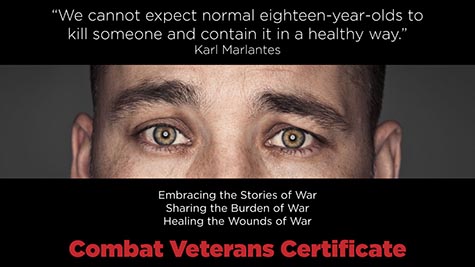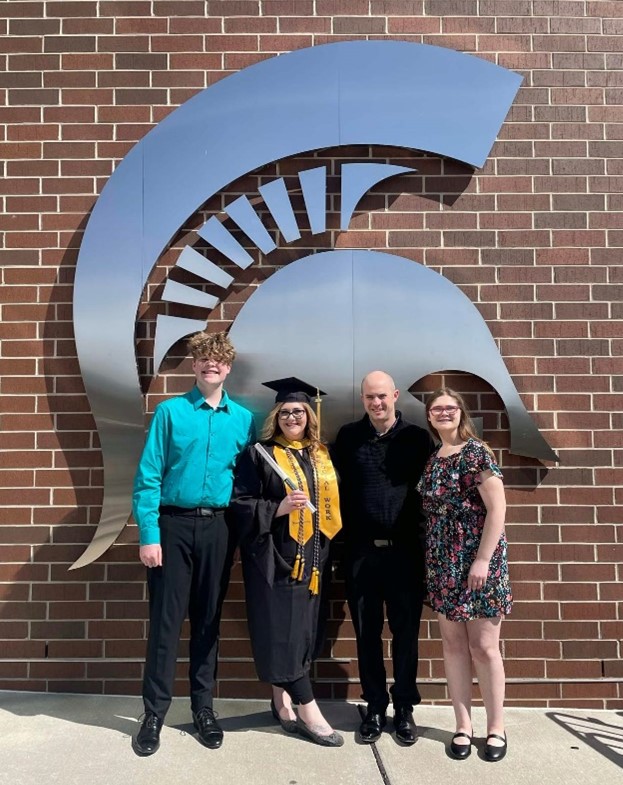Combat Veterans

Designed for civilians, service members, and veterans who have a passion to help those who have been exposed to the trauma of war or military conflict through their service in the U.S. Armed Forces, the Combat Veterans Certificate is open to current MSW students and Human Service Professionals through the School of Social Work’s Continuing Education Program.
The first course in the certificate program, Embracing the Stories of War, uses an immersive, storytelling approach to deepen students' understanding of the military cycle, from enlistment, basic training, the experience of war, and post-war challenges. This is a standalone course. For many students and human service professionals, the first course will be all they need.
The second course, Sharing the Burden and Healing the Wounds of War, focuses on society’s response to and care for its service members and veterans, with an emphasis on improving policies and programs to better meet their needs. Students also learn about the differences between treatment and healing, the overlap and unique features of common combat injuries (post-traumatic stress, traumatic brain injury, and moral injury), and the role complex trauma plays in post-military adjustment, including the need to assess for and address pre-military trauma.
The CVC courses were created by instructors Tina Thompson and Glenn Stutzky (retired). Embracing the Stories of War was selected for the 6th Annual SAGE/CSWE Award for Innovative Teaching in Social Work Education and received Honorable Mention in the 2017 MSU AT&T Instructional Technology Awards for Best Fully Online Course.
The CVC courses are online and accessible to MSW students throughout the state and human service professionals throughout the country.
Frequently Asked Questions
Yes! Most of the content covered in this certificate program applies to ALL veterans, such as military history and culture, reasons for enlisting (or the experience of being drafted), the purpose and rationale of basic training, military masculinity (which impacts both men and women), mental health stigma, and military sexual trauma.
Also covered are the common challenges experienced when transitioning out of the military, such as underemployment/unemployment, poverty, homelessness, incarceration, and impact on the family (partner, children, etc.), all of which play a role in the current veteran suicide rate.
Students also learn about the system of care available to veterans, including the VA, Vet Centers, and non-profit organizations working to address the veteran suicide epidemic.
The certificate program focuses on complex trauma, with combat being just one layer of this. Students learn about pre-military trauma (ACEs) and the role it plays in enlistment1 and post-deployment adjustment, including depression and Post-Traumatic Stress (PTS)2, as well as suicidal thoughts and attempts3.
Combat exposure in and of itself doesn’t lead to suicide, but combat exposure does increase risk for PTS, depression, and substance abuse4, as well as moral injury5, all of which increase suicide risk.
A 2015 meta-analysis found that exposure to killing and other war atrocities corresponded to a 43% increased risk for suicidal behavior, which included ideation, attempts, and death6.
Combat trauma can result in multiple types of injuries, such as Traumatic Brain Injury, PTS, and moral injury. Students in this certificate program explore these injuries, how they impact the brain in different ways, how they are often overlapping, and how they each require different therapeutic approaches.
While the factors contributing to veteran suicide are complex, and not all veterans who die by suicide have experienced combat, we spend a great deal of time exploring combat trauma, as the experience of combat is far removed from what most civilians know and understand.
In order to bridge this divide between combat veterans and human service professionals, it is important for them to hear these veterans’ stories with an open mind and open heart as they develop a deeper understanding and empathy for what combat veterans have experienced.
1Blosnich, J. R., Dichter, M. E., Cerulli, C., Batten, S. V., & Bossarte, R. M. (2014). Disparities in Adverse Childhood Experiences among individuals with a history of military service. JAMA Psychiatry, 71(9), 1041-1048. doi:10.1001/jamapsychiatry.2014.724
2Cabrera, O. A., Hoge, C. W., Bliese, P. D., Castro, C. A., & Messer, S. C. (2007). Childhood adversity and combat as predictors of depression and post-traumatic stress i deployed troops. American Journal of Preventive Medicine, 33(2), 77-82. doi:10.1016/j.amepre.2007.03.019
3Carroll, T. D., Currier, J. M., McCormick, W. H., Drescher, K. D. (2017), Adverse Childhood Experiences and risk for suicidal behavior in male Iraq and Afghanistan veterans seeking PTSD treatment. Psychological Trauma: Theory, Research, Practice, and Policy, 9(5), 583-586.
4National Center for PTSD. (n.d.) Combat exposure. U.S. Department of Veterans Affairs. Retrieved from https://www.ptsd.va.gov/understand/types/combat_exposure.asp
5National Center for PTSD. (n.d.). Moral injury in the context of war. U.S. Department of Veterans Affairs. Retrieved from https://www.ptsd.va.gov/professional/treat/cooccurring/moral_injury.asp#four
6Bryan, C. J., Griffith, J. E., Pace, B. T., Hunkson, K., O’Bryan, A. O., Clemans, T. A., & Imel, Z. E. (2015). Combat exposure and risk for suicidal thoughts and behaviors among military personnel and veterans: A systematic review and meta-analysis. Suicide and Life-Threatening Behavior, 45(5), 633-649. Doi: 10.1111/sltb.12163
Veterans who served in Vietnam, Afghanistan, and Iraq have shared their stories for Embracing the Stories of War. Students also learn from veterans who served in the Korean War and Gulf War, as well as those who served in the military in other countries. These veterans represent men and women, commissioned and non-commissioned service members, those who enlisted and those who were drafted, as well as those who served active duty across various branches and in the National Guard.
 “Entering the CVC program, I had no idea what a huge impact it would have on my professional aspirations and more so on my personal life. I was completely unaware how underserved the veteran population was and how desperately good clinicians are needed. Personally, it helped my husband and I grow so much closer because he felt safe enough to share his experiences as an OIF/OEF combat veteran. Before I took this class, he would only share minimal bits of information and in a very general way. Once he saw how invested I was and how accepting I was of the combat veteran experience, he started telling me stories I had never heard, showing me pictures from his deployment I had never seen, he finally started unpacking his military-issued bags with the clothes he took off after he returned home, shoved into the bag, and never opened again. Literally and figuratively, he started to unpack his baggage from his deployment. I am forever grateful for this program and how deeply impactful it has been."
“Entering the CVC program, I had no idea what a huge impact it would have on my professional aspirations and more so on my personal life. I was completely unaware how underserved the veteran population was and how desperately good clinicians are needed. Personally, it helped my husband and I grow so much closer because he felt safe enough to share his experiences as an OIF/OEF combat veteran. Before I took this class, he would only share minimal bits of information and in a very general way. Once he saw how invested I was and how accepting I was of the combat veteran experience, he started telling me stories I had never heard, showing me pictures from his deployment I had never seen, he finally started unpacking his military-issued bags with the clothes he took off after he returned home, shoved into the bag, and never opened again. Literally and figuratively, he started to unpack his baggage from his deployment. I am forever grateful for this program and how deeply impactful it has been."
~ Amanda Erspamer, 2024 MSW CVC Graduate
Current MSW Students
The Combat Veterans Certificate Program is open to both Clinical and OCL students and requires satisfactory completion (minimum grade of 3.0) of the following:
- SW 491: Embracing the Stories of War (3 credits, fall semester)
- SW 891: Sharing the Burden and Healing the Wounds of War (3 credits, spring semester)
Note: Students are required to take these classes in the order outlined above, as the first class covers foundational content needed for the second class. It is also highly recommended that students complete these classes BEFORE their final year in the MSW program in preparation for their specialized veteran-related field placement during their advanced concentration year. CVC students also participate in a specialized liaison group (via Zoom) during their advanced concentration year.
Service members and veterans in the MSW program (who are in good academic standing and pursuing the CVC) may be eligible for the Reeves Fellowship!
Interested in helping veterans earn their MSW? Learn more about our MSW Veterans Scholarship and donate today!
Contact Person
Tina Thompson, LMSW
blaschke@msu.edu
MSW Certificate Application
“Tina Thompson and Glenn Stutzky have created a program that is so much more than 'just another class.' Through their comprehensive selection of a variety of media from movies, videos, books, professional articles, podcasts, and first-hand veteran interviews, they allow the student to truly dive into the material in a deeply personal way. The first class, Embracing the Stories of War, allows the student not just to study the topic, but to live it. Immersing oneself through the use of all the senses – touch, smell, sight, hearing, taste - into the life and experience of a veteran takes this course to a wholly different level.
Once immersed in the course, Tina and Glenn’s care and concern for each of their students is evident. They were always prepared to throw a life preserver when the waters get choppy, knowing firsthand how challenging the material can be. As a veteran of Operation Iraqi Freedom, I appreciated how they amended some of the coursework to provide those of us who have served in our recent conflicts space to process our own experiences while sharing with the others in the class. This space allowed the combat veterans of the class to tread the waters of sharing in a safe and respectful way. The certificate was a deep period of self-examination and discovery for all of us, veteran and non-veteran alike.
If you seek more in your educational experience than just lectures, study guides and rote memorization, this certificate is definitely for you. Offering an opportunity to live the experience, grow personally and professionally, reinforce and form a plan for healing the hearts and souls of those who have given so much in service to our country, Tina and Glenn have created just that place for you.”
~Mark Voelker, Major USMC (Ret), OIF Veteran, 2021 Continuing Education CVC Graduate
Continuing Education for Human Service Professionals
Designed to meet the needs of human service professionals already in the field, the continuing education option allows those with a minimum of a bachelors degree in a human service related field and an interest in learning more about combat veterans an opportunity to complete this coursework alongside registered MSU students - same classes, same experience, lower cost! Each class costs $500 plus course materials. Social work continuing education contact hours (CECHs) are available for both courses!
Program Components
The Combat Veterans Certificate requires satisfactory completion of the following:
- Course 1: Embracing the Stories of War (next offering starts August 2025!) - 104 Continuing Education Contact Hours
- Course 2: Sharing the Burden and Healing the Wounds of War (January 2026)
Note: These courses must be taken in the order listed above, as the first class covers foundational content needed for the second class.
Continuation into Course 2 is not automatic; this will depend on satisfactory completion of Course 1 (a grade of at least 80%), and available “seats” which may be limited.
You will receive a Certificate of Course Completion for each course, but successful completion of both classes is required for the full Combat Veterans Certificate.
To apply for the first class, please complete the continuing education application. If accepted, you will receive information on registration and purchasing the necessary course materials. Once accepted and registered for the course, a refund cannot be issued.

